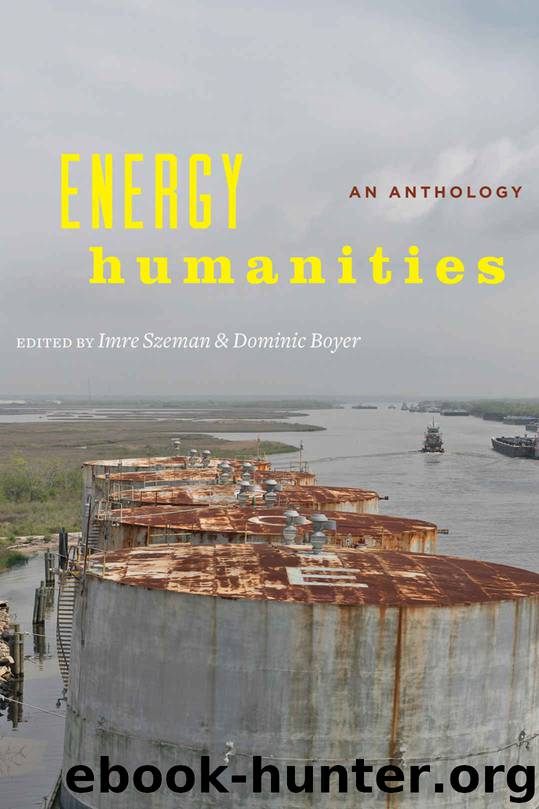Energy Humanities: An Anthology by Imre Szeman & Dominic Boyer

Author:Imre Szeman & Dominic Boyer
Language: eng
Format: epub
Publisher: Johns Hopkins University Press
Published: 2017-04-08T16:00:00+00:00
Biopolitics in the Anthropocene
The politics of energy transition and climate change mitigation, as they become articulated in their local and global dimensions, are, to put it euphemistically, a challenge. They have often proven resistant to the mechanisms of global governance and protocols, resulting in failed agreements and missed targets. The Isthmus of Tehuantepec is a case that illustrates several tensions that condition energy transitions, from sovereignty claims to dreams of sustainability. It raises critical questions about the future of renewability. For example, will energy transition be determined by the pipeline politics and grid formations of our carbon past or not (Coroníl 1997; Mitchell 2009, 2011; Sawyer 2004)? And how does a particular collective will or voice—either those of local communities or those of state institutions and private companies who purport to speak for national interests and global benefits—come to take precedence? Oaxaca is one of the poorest and least energy intensive states in the country of Mexico, a country which itself has not produced carbon contamination on the scale of the Global North. Yet, both government functionaries and renewable energy companies are fully committed to making the region a sustainable energy powerhouse. There is no inherent incommensurability between renewable energy implementation and economic and social equity. However, as we see in the Oaxacan case, these processes are profoundly shaped by the ways in which ecoauthoritative positions are generated, legitimated, and implemented or, alternately, refused and diminished.
Among residents of the Isthmus, there is remarkably little talk of climate change remediation or a commitment to providing the means for clean electricity generation. Instead, people voice concerns about land, fish, work, and culture. The Mexican state and transnational renewable energy corporations investing in Oaxaca are, conversely, speaking the language of climate change and greenhouse gas reduction. An anthropogenically altered world would seem to be a condition that demands new mobilizations of biopower.18 Instead, however, the politics of climate change and the related process of renewable energy transition appear to depend on familiar biopolitical frameworks: improving schools and clinics, providing jobs and roads, and managing populations in the service of development, investment, and growth. These are biopolitical concessions spoken in the idiom of energopolitical shifts,19 suggesting that indigenous peasants are state subjects whose precarity can be solved through publicly funded material improvements. Those in opposition to the way that renewable energy projects are being implemented in the Isthmus rely on these same biopolitical frameworks. The resistencia too calls for the protection of livelihoods to ensure that poor and marginalized populations are not dispossessed of the few resources they have been granted: land and access to ocean and lagoonal fishing. These sorts of biopolitically motivated solutions parallel the logics that have driven development policies for decades. They also reiterate many of the climate change discourses and policies of the last several years, or what Anthony Giddens (2009:8) has called the “convergence” of political and economic stimuli to facilitate the use and distribution of sustainable energy.
Central to the process and politics of transition, as I have
Download
This site does not store any files on its server. We only index and link to content provided by other sites. Please contact the content providers to delete copyright contents if any and email us, we'll remove relevant links or contents immediately.
| Books & Reading | Comparative Literature |
| Criticism & Theory | Genres & Styles |
| Movements & Periods | Reference |
| Regional & Cultural | Women Authors |
4 3 2 1: A Novel by Paul Auster(12392)
The handmaid's tale by Margaret Atwood(7763)
Giovanni's Room by James Baldwin(7346)
Asking the Right Questions: A Guide to Critical Thinking by M. Neil Browne & Stuart M. Keeley(5775)
Big Magic: Creative Living Beyond Fear by Elizabeth Gilbert(5771)
Ego Is the Enemy by Ryan Holiday(5448)
The Body: A Guide for Occupants by Bill Bryson(5096)
On Writing A Memoir of the Craft by Stephen King(4943)
Ken Follett - World without end by Ken Follett(4731)
Adulting by Kelly Williams Brown(4574)
Bluets by Maggie Nelson(4556)
Eat That Frog! by Brian Tracy(4540)
Guilty Pleasures by Laurell K Hamilton(4448)
The Poetry of Pablo Neruda by Pablo Neruda(4106)
Alive: The Story of the Andes Survivors by Piers Paul Read(4031)
White Noise - A Novel by Don DeLillo(4009)
Fingerprints of the Gods by Graham Hancock(4004)
The Book of Joy by Dalai Lama(3986)
The Bookshop by Penelope Fitzgerald(3853)
